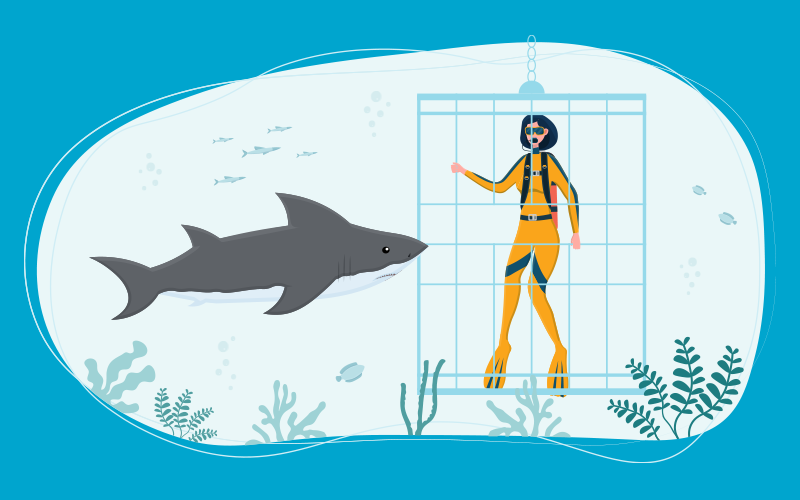
Recently, I read a long article about the movie Jaws. What has come to be known as a genre-defining film had a production absolutely plagued with issues, including a malfunctioning mechanical shark. In a move that is rife with logistical lessons, the shark had only been tested in fresh water and had mechanical problems when introduced to the significantly more corrosive saltwater ocean filming location. In addition to scripting delays, infighting among the cast, a literal sinking ship, and other issues, some of the scenes had to be completely reimagined now that the shark was deemed mechanically unreliable. Because of that poor planning and lack of testing, the eventual audience got those iconic anticipation scenes. You likely know them well: dramatic camera shots of starkly lit, dangling human legs, legendary music, chaotic splashing, and a lone severed limb floating to the bottom of the ocean. In fact, the shark doesn’t make its onscreen appearance until more than a full hour into the film! You may also be shocked to know that the total screen time for the shark is fewer than five minutes. How can something we likely all remember as so terrifying show up so late and for such a short amount of time? This is an excellent lesson that the anticipation of something scary is WAY WORSE than the confrontation of that scary thing. I’ll say it again for the people in the back: anticipation is much scarier than confrontation.
What can a malfunctioning mechanical shark teach us about leadership? It turns out quite a bit.
Confront the scary thing.
What is it on your to-do list that keeps getting pushed because it’s too big or too frightening to tackle? Is it a difficult conversation with someone on your team? A stretch assignment? A termination that is long overdue? An honest conversation with a service provider about sub-par performance? While none of those things are necessarily fun to tackle, the longer you put them off and build up the anticipation, the worse the task (and you) will feel. I don’t think I’m alone in experiencing stress and anxiety before doing something that makes me uncomfortable. I can create some pretty fantastical scenarios in my mind of all the things that COULD go horribly and embarrassingly wrong. In reality, it’s incredibly rare for any of those things to actually happen. All I’ve done in creating those scenarios is manufacture unnecessary stress, lose sleep, and allow a situation to potentially get further out of control. I’ve let the fear of the metaphorical shark stop me from even having the chance to get a bigger boat! It’s falling victim to scary anticipation instead of seizing control. How can we peek out from between our fingers and just do the dang thing? Here are some tips for overcoming the fear anticipation creates:
Confrontation is not an inherently bad thing. In fact, it’s an entirely necessary and often healthy part of mature relationships. Can you imagine if you never confronted your children when they misbehaved or addressed their unacceptable behavior? Scary, right? So, why do we think it would be easier to tiptoe around a conversation with a co-worker or a leader at the firm, hoping problems will just go away? We’re conditioned to think of confrontation as bad. I encourage you to consider the alternative: A bad situation stays bad. You live in anxiety or fear for too long. The toxic environment intensifies. Trust me: confrontation isn’t the enemy. Oftentimes, it’s the solution.
It’s really tempting to be a jerk or expect someone else to be a jerk when it comes to confrontation, and that may be what makes it so scary. We think of confrontation as yelling and fighting. It doesn’t have to be that way! Not all confrontation is a sharp-toothed malfunctioning shark flopping onto the deck of the boat. Practice having a tough conversation while keeping your voice soft and calm. It truly is possible to deliver a tough message in a compassionate, respectful, and objective fashion. Often, I hear young or inexperienced leaders struggle to hold their team accountable or have an honest conversation. My best advice is to keep the conversation objective. If someone isn’t hitting their KPIs, is showing up consistently late, or isn’t delivering quality work, that is a fact. Facts should not be tough to communicate. When you lead with the problem, keep it specific to that problem, and don’t create an all-out attack on character, the message becomes not only easier to deliver, but also easier to swallow. Practice this phrase, “What would you do if you were me?” when having tough conversations. It opens the door for the other person to acknowledge that you’re not attacking them and gives them the chance to think things through from another perspective.
You’ve probably heard the expression, “eat the frog.” It means that the wise move is to tackle the toughest or least appealing item on your to-do list first. If you have to eat a frog or go face-to-face with a killer shark, you might as well get it over with as quickly as possible, right? The same goes for the thing on your to-do list that is looming over your day. I’ve absolutely fallen victim to ticking every single easy box on my list, even creating tasks that weren’t originally on there just to avoid taking a bite of that pesky frog. Suddenly, my desk needs rearranging, the dishes need attention…does the dog need to go out? It’s tempting to do absolutely anything to avoid THAT thing. When you find yourself re-categorizing your emails just to avoid that frog on your list, it’s time to take a bite. I guarantee you the anticipation of the thing is scarier than the actual thing, and you’ll feel a huge weight lifted by tackling the beast.
When you think of going face-to-face with the shark, you might be tempted to throw absolutely everything in the boat at it all at once. If you’re going to have a tough conversation, you might as well get it all out at one time, right? Wrong. Instead, consider a more targeted approach. Confrontation works best one issue at a time. Give each item or conversation the time and attention it truly deserves, and resist the urge to unleash every problem at once. Think of it this way, if you have to have a tough conversation with your spouse, you don’t want to bring up every other tough conversation and slight annoyance. That takes focus from your main issue and creates unnecessary strife.
Jaws gives us plenty of lessons on business and leadership. (Don’t even get me started on proper preparation and planning. Why was the mechanical shark never tested in salt water?) The biggest lesson we can take away from that legendary movie is this: anticipation is downright terrifying. Our mind creates a bigger shark, a smaller boat, and a bloodier scene. So, hear the scary music (DA DUH, DA DUH…) and confront the thing. Schedule the conversation. Tackle the project. Feel the fear and push through it anyway. It’s only in the movies that the shark seeks revenge in the sequel.



